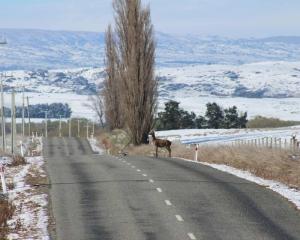Plans for tighter alcohol restrictions in Dunedin have attracted about 4500 submissions, the bulk opposing the changes - and some prompting a language warning.
Many submissions say the best way to reduce alcohol-related harm is to restrict alcohol sales from supermarkets rather than put more restrictions on bars.
But public health and medical groups are calling on the council to close bars even earlier.
Submissions on the draft policy were released by the Dunedin City Council yesterday with a warning some contained ''foul and/or offensive'' language.
The majority - 3000 - were made via a campaign by inner-city licensees who oppose new restrictions on bars.
The exact number of submissions is expected to be confirmed this week. Submissions from the Dunedin Inner City Licensee Forum's campaign are understood to almost exclusively oppose the proposals.
The ODT perused several hundred submissions, including those from key groups, yesterday, responding to the draft plan.
Among other things, the draft proposes to cut central-city bar closing times by one hour to 3am; a one-way door policy after 1am; a ban on shots after midnight; licensing for bars' use of footpaths before 11pm; and banning off-licence sales after 10pm.
Most submitters filled in a yes/no form that provided an opportunity to make comments.
The majority of the submissions read opposed the proposals.
Most of the Forum submitters simply responded no to questions, which were framed in a ''Do you support ...?'' manner, and few made extra comments.
Kate Sparks' comment summarised a common comment: ''I think introducing this policy will negatively affect the hospitality industry while not getting to address the cause of alcohol related harm, buying cheap liquor from supermarkets and drinking unsupervised at home.''
Hannah McEntee wondered if the proposal would put her out of a job, while Lauchlan Chisholm also urged the council to target supermarkets and ''don't attack the easy guy''.
Erin Cameron said positive drinking behaviour was not about the level of restriction, but how well the drinking environment was controlled.
Jillian Haig said closing bars in residential areas earlier would lead to disruption to residents and more domestic violence.
''We're in the 2000s, not the 1920s. If a hotel, or tavern or cafe etc is run correctly, things should be left alone.''
Others urged the council not to ''destroy a good time'', while several were abusive and used explicit language to air their views about the proposal and the council.
''Drik [sic] more,'' one person submitted.
Dunedin bar owners and the Otago Chamber of Commerce said the proposals would affect many businesses and raised concerns the proposals could amplify alcohol harm, rather than reduce it, by encouraging people to move from controlled to uncontrolled environments.
Industry groups said premises should be treated according to their track records and the council had failed to give enough weight to individual responsibility. They said the proposals did not address the core causes of excess drinking, many pointing the finger at supermarkets selling below-cost alcohol. Most supported increasing restrictions on off-licences.
Off-licence holders, including supermarkets, opposed any restrictions based on proximity or density.
On the other hand, police supported the draft policy and said there was evidence that reducing bar opening hours resulted in less alcohol-related harm.
''Police recognise some of the proposed restrictions will have an economic impact on some of Dunedin's licensed premises, but this must be weighed against the economic impact alcohol-related harm is having on society,'' Sergeant Ian Paulin's submission said.
Others wanted the policy to go further.
Residential student colleges and public health groups, including the Medical Association and Dunedin Hospital emergency department staff, said the South had the highest level of hazardous drinking in the country.
Their submission sought blanket closing at 2am, as research showed people were three times more likely to drink large amounts after 2am.
They were joined by social agencies, student associations and the University of Otago in wanting a clause added to the policy setting outlet density rules.
About 400 individuals and groups indicated they wished to verbally present their submissions to the council during a nine-day hearing that begins on Tuesday.










